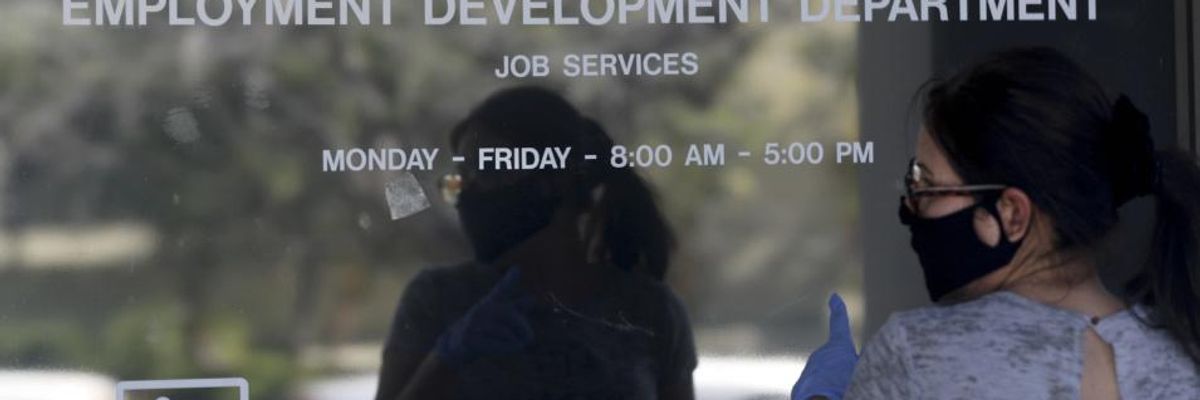The Coronavirus crisis has made workers reel. With businesses forced to institute mass layoffs to cope with the economic shutdown forced by COVID-19, over 36 million have lost jobs in the last two months. As business and labor leaders working together to achieve universal health care, we are greatly concerned for the more than 27 million Americans who are losing their health insurance because of these layoffs, and the millions more who can anticipate losing their jobs and health insurance in the coming weeks.
The COVID-19 crisis has exposed the fundamental flaw in America's employer-based system of health insurance. Linking health insurance to employment was never a good idea. It is particularly disastrous for the millions of families thrown onto the roles of the uninsured just when they lose income, and just when the spreading pandemic makes it more urgent for everyone's sake that we all have access to needed health care. We are both working to fix that structural flaw, but right now the federal government must act to ensure that any American unemployed has full access to health care.
"The COVID-19 crisis has exposed the fundamental flaw in America's employer-based system of health insurance. Linking health insurance to employment was never a good idea."
Following the lead of the health insurance industry, Speaker Pelosi and the Democratic majority in the U.S. House on Friday passed a proposal--part of the HEROES Act--for the federal government to buy health insurance for laid-off workers through the COBRA program. Named for the federal law that created the program, COBRA allows the newly unemployed to buy their old employment based insurance at 102% of the cost paid through their employer.
While allowing the unemployed to maintain their old coverage, this is far from the solution we need. It would be a giveaway to the health insurance industry at a time when we desperately need federal dollars to prop up failing employers and to protect workers as they lose their jobs or face reduced working hours. Nor does subsidizing COBRA solve the problem of maintaining health insurance for the unemployed because it only applies to workers who had employer-sponsored insurance for at least six months before they were laid off, at a job where they had at least 20 co-workers. Too many recently hired workers, employees of small businesses, and self-employed workers would be left out under this proposal.
In addition, much of the private insurance that workers receive through their employers includes significant out-of-pocket costs that are burdensome for workers even when they are fully employed. These costs could easily put medical care out of reach for the newly unemployed. While it may be a windfall for the insurance company that issued the policy, a worker stuck with a high deductible plan will see little benefit from having its COBRA payments fully subsidized.
Fortunately, we have a better solution. Enroll the unemployed automatically in Medicare, as proposed in the Medicare Crisis Program Act, sponsored by Rep. Pramila Jayapal and Rep. Joe Kennedy. This would meet the individual needs of those displaced by national policy, and the public-health need to limit the spread of a communicable disease. Furthermore, because Medicare has dramatically lower administrative costs and uses its bargaining leverage effectively to negotiate lower prices than those paid by private health insurers, moving people from private health insurance onto Medicare would substantially lower the national cost of health care.
"The immediate and necessary solution is simple: expand Medicare to cover all the newly unemployed and relieve a massive burden on millions of families."
Without taking account of the extra administrative expense, covering the newly unemployed through COBRA and private health insurance would cost as much as $331 billion. By contrast, an improved Medicare with comprehensive coverage could be provided for $243 billion, saving our country $88 billion while still providing better coverage than is available now. To repeat: even without taking account of the extra administrative expense of COBRA, covering the newly unemployed through Medicare would save 27 percent of the cost, while providing better insurance through reduced administrative waste and the reduction in inflated hospital and physician prices.
Providing emergency Medicare coverage to all unemployed workers would encourage workers and their families to get the care they need in a timely fashion. Hard-pressed health care providers would be assured of payment for providing that care. And employers forced to temporarily furlough their employees or reduce their hours would know that their health care needs will be taken care of.
The immediate and necessary solution is simple: expand Medicare to cover all the newly unemployed and relieve a massive burden on millions of families. Rather than fall into the trap of propping up failing health insurance companies, Congress must take this action now to protect America's businesses and workers.
